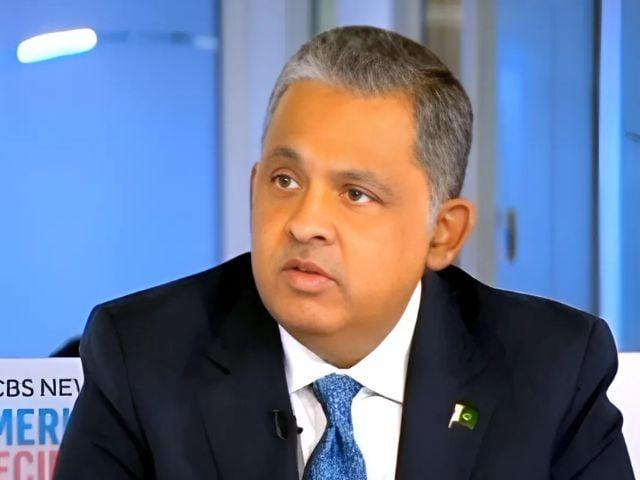The Pakistan ambassador to the United States, Rizwan Saeed Sheikh, warned that the recent rhetoric and Hindutva actions of India, which reflect a “terrorist mentality,” threaten regional stability.
Speaking to multiple media in Washington, Rizwan Saeed Sheikh said that India’s handling of the Indo Water Treaty showed contempt for international law.
“The treaty does not contain any disposition for unilateral termination or suspension,” said the ambassador. “India’s attempt to use water as a weapon is illegal and inhuman, and the international community will not support such actions.”
In addition, he criticized the recent comments and visual exhibitions of Indian leadership, including a map of Akhand Bharat in the Indian Parliament, describing it as a reflection as “hegemonic mentality and sinister intentions.”
The ambassador affirmed that the use of anti-Pakistan rhetoric for the internal political benefit in India was a “dangerous strategy” that risked inflamed nationalism. “India’s participation in Baluchistan is no longer a secret,” added Rizwan Saeed Sheikh.
Ambassador Sheikh also praised the United States for his role in maintaining the high fire agreement between India and Pakistan. He praised the former president of the United States, Donald Trump, for promoting peace in the region and requested a continuous American commitment on the issue of Kashmir.
“We appreciate the peace efforts of President Trump and we hope they continue within the established frame to resolve the Kashmir dispute.”
The Treaty of the Water of the Indo, signed in 1960 under the supervision of the World Bank, governs the exchange of water between India and Pakistan.
Previously, the Indian prime minister, Narendra Modi, said that Pakistan will not obtain water from the rivers on which India has rights that increase rhetoric in a confrontation about access to water triggered by a deadly attack in Jammu and Kashmir (Iiojk) occupied by the Indians.
The legal director of Pakistan, in an interview with Reuters, replied that Islamabad was still willing to discuss the exchange of water among the neighbors, but said that India must comply with a treaty of decades.
“Pakistan will have to pay a heavy price for each terrorist attack … Pakistan’s army will pay it. Pakistan’s economy will pay it,” Modi said in a public event in Rajasthan.
India-Pakistan facing
The last climb between Pakistan and India began on April 22, when an attack in the city of Pahalgam of Iiojk Resort killed 26 people. India immediately blamed Pakistan for the incident, despite not providing public evidence.
In response, India carried out a series of hostile actions the next day of April 23, including the suspension of the 65-year-old Indus Water Treaty (IWT), canceling the visas for Pakistani citizens, closing the border crossing of Wagah-Attari, ordering the closure of Pakistan’s high commission in New Delhi, and reduction of the diplomatic staff of the crosses.
Pakistan strongly rejected the accusation, qualifying it without foundation, but took reciprocal measures through its National Security Committee (NSC). These included stopping the trade with India, closing the Pakistani airspace to the Indian aircraft and other contracts.
Tensions intensified even more in the early hours of May 7, when missile attacks hit six cities in Punjab and Azad Jammu and Kashmir (AJK), destroying a mosque and killing dozens of civilians, including women, children and elders.
In a rapid military response, Pakistan’s armed forces knocked down the Indian combat planes, including three Rafale aircraft, widely considered as a key asset of the Indian Air Force. During the next two days, India launched waves of Israeli manufacturing drones, which were also neutralized by the Pakistan army.
The confrontation intensified again in the early hours of May 10, when India attacked several Pakistani air bases with missile attacks. In retaliation, Pakistan launched the Bunyanum Marsoos operation, damaging Indian military facilities, including missile storage sites, air bases and other strategic objectives.
For Saturday night, the president of the United States, Donald Trump, announced that the fire had been reached after intense diplomatic efforts during the night. Minutes later, the agreement was confirmed separately by the Minister of Foreign Affairs of Pakistan, Ishaq Dar, and the Secretary of Foreign Affairs of India.
But despite the high military fire, the war of narratives has fought.
While Pakistan publicly accredited the president of the United States, Donald Trump, together with China and the Gulf states, for playing a vital role in the disable of tensions, India minimized foreign participation.
Indian officials have insisted that the truce was the result of direct bilateral conversations.
However, Trump has reiterated his position twice after the initial announcement.




